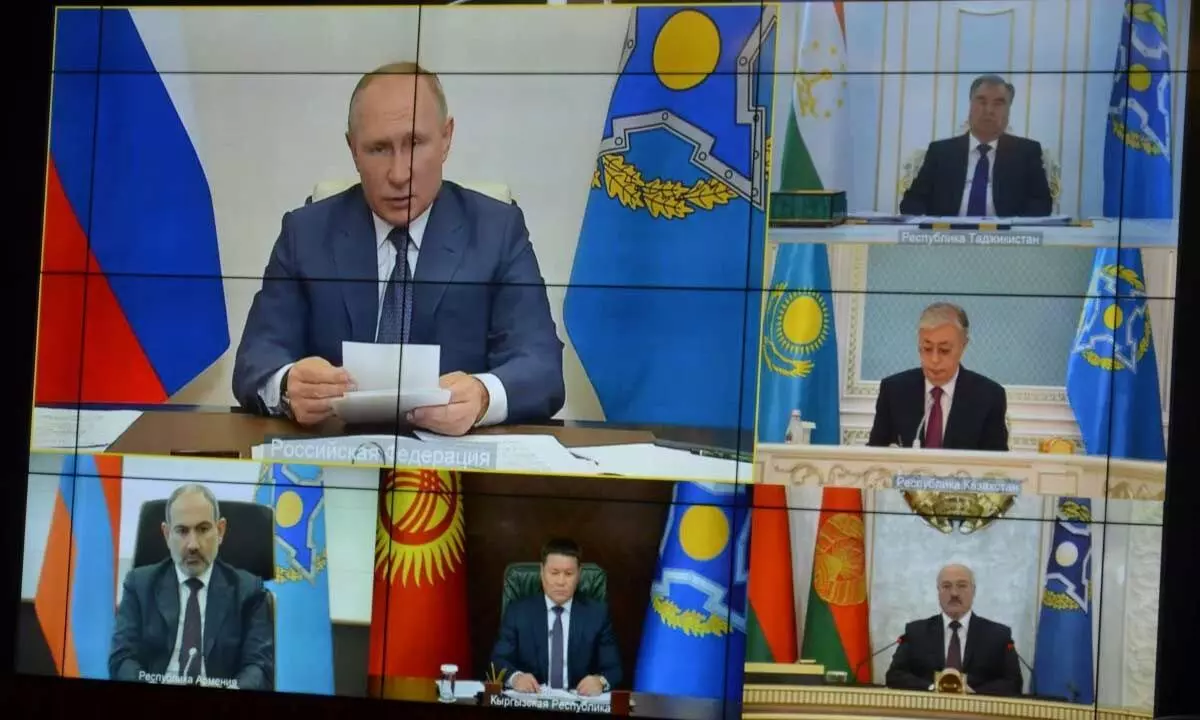Will Russia-led CSTO survive Ukraine war?

Will Russia-led CSTO survive Ukraine war?
The Moscow-led Collective Security Treaty Organisation (CSTO) has just received its major jolt – one may say even an existential one
The Moscow-led Collective Security Treaty Organisation (CSTO) has just received its major jolt – one may say even an existential one. And it has not come from one of the muscle flexing central Asian states but from one of Russia's closest allies – Armenia. And it may be symbolic of the covert shifts taking place in wake of Russias Ukraine operations.
At a recent summit meeting of the heads of the member states of the Moscow-led Collective Security Treaty Organisation held in Yerevan, Armenia, the host country refused to sign the summit declaration, calling into question the effectiveness of the alliance. Prime Minister Nikol Pashinyan also criticised the role of the organisation in his speech. Coming from a state that is Russia's close ally for more than a century, economically weak, and dependent on Russia, it can be construed as a major jolt to the alliance.
The CSTO had been established in 2002 as a defence alliance, with Russia, Belarus, Armenia, Kazakhstan, Kyrgyzstan, and Tajikistan as its members. Uzbekistan had joined for a while, but then left it. One of its stated objectives is of preserving territorial integrity and seeking closer cooperation with other multilateral institutions, such as the United Nations, Organization for Security and Cooperation in Europe, Shanghai Cooperation Organization, etc. Article 4 of the Collective Security Treaty Organization says that the aggression against CSTO member states is considered by other participants as aggression against everyone. It is dominated by Russia, its most powerful state, and which contributes the most too in terms of troops, and resources.
In this regard, the CSTO's recent role in Armenia (a member) and Azerbaijan, (a non-member) has come under criticism and scrutiny in the South Caucasian country. In general, there have been rumblings against Russia's role in the conflict over Nagorno-Karabakh. Though Russian peacekeepers are in the conflicted territory, the war ended in huge losses for Armenia, possibly the closest Russian ally after Belarus in the post-Soviet space. But the more recent clashes, which Armenia accuses Azerbaijan of directing at Armenian territory, well within its internationally recognised border elicited no response from member states, leave alone any action by the CSTO itself in defence of its member state.
The CSTO did send a fact-finding mission to Armenia, but that was as far as it went. None of the member-states issued any condemnation of the aggression. This has seriously called into question the role of the CSTO in preserving its avowed intent on territorial integrity. Earlier, the grouping had roiled member Belarus. It could not tackle the internal and border violence that had broken out when in 2010-member state Kyrgyzstan threw out its president Kurmanbek Bakiev. More recently the CSTO was nowhere to be seen in the very violent Kyrgyz-Tajik border clashes, with both being member-states of the alliance.
However, it did shore up border security with Tajikistan in the wake of the Taliban takeover, keeping that border safe, and engaged in a number of drills with other member-states to keep violence and threats emanating from Afghanistan, which borders three of the Central Asian republics, including sharing a long border with Tajikistan, a CSTO member, and very close to Kyrgyzstan, another CSTO member.
The CSTO effectiveness was called out earlier this year when Tajik-Kyrgyz border clashes erupted. To that effect, Russian President Vladimir Putin had to placate the heads of both states during a CIS summit in Asthana in October. The CSTO, like the Eurasian Economic Union, is a Russia-led alliance. With Russia preoccupied in Ukraine, there is a sense that much of the CSTO's future will depend on the outcome of that conflict. This was one of the reasons why Russia felt the need to hold the first ever Russia-Central Asia Dialogue this year in October, it was to majorly reassure its Central Asian partners that Russia was not turning away from the security architecture it had helped cement with them through organisations like the CSTO.
All eyes are on the Russia-Ukraine conflict. If Russia wins, there is a sense that the organisation, in spite of all hiccups, will survive. And that remains to be seen.








